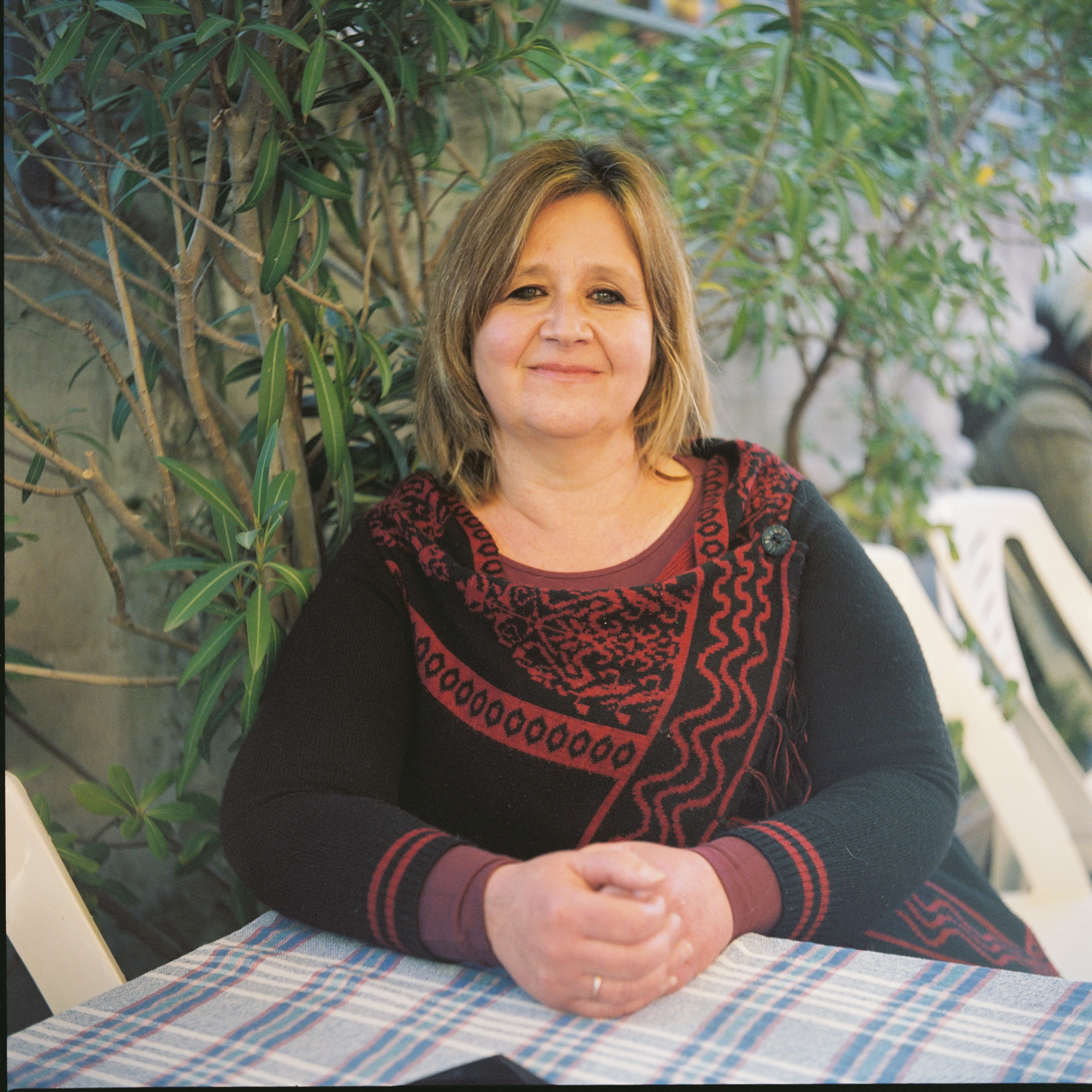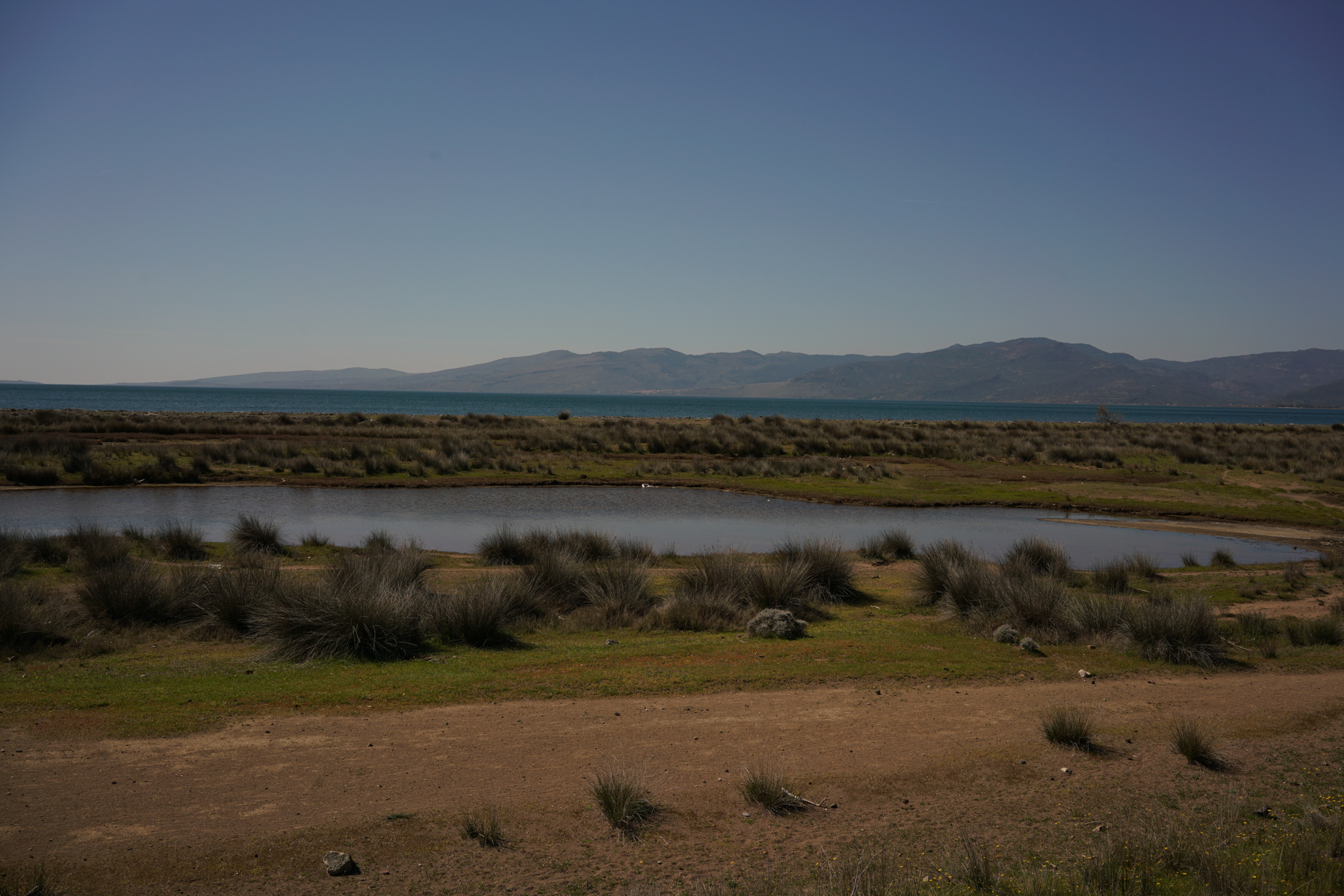Andreas & Gina outside Cosmopolitan hotel. March 2017. Lesvos, Greece. photo: Talitha Brauer
GINA AND ANDREAS
Andreas has lived on Lesvos his whole life. Gina, the daughter of Greek immigrants, moved back to Greece as a teenager. They own a hotel just a couple of kilometres from Moria refugee camp. We first spoke in November 2016.
~Interview by Talitha Brauer
GINA: Well, after we sold our house over there [in Australia], we bought a house here, in Mytilini. I didn't get a job there, I wasn't working. I was just doing nothing. And then I met my husband...
How old were you?
G: 17. He owned a shoe shop. And I started working over there, helping him. Not working, just helping him. So then, after some years, in 1992, having a house here, we decided to make a small hotel -- me and my husband. My mom just said "OK", because it was her house. So we tore the house down, and built this business, and it started working in 1992. So we probably started building it in 1991.
Gina outside Cosmopolitan hotel. March 2017. Lesvos, Greece. photo: Talitha Brauer
And did you call it "Cosmopolitan" from the beginning?
G: Yes, we called it "Cosmopolitan" from the start.
And so is this the original...?
G: Yes, this is what we built in 1992. It's more or less the same style, it's traditional. Besides decoration changes, it's more or less the same.
So you've been running this for 24 years?
G: Yes, my husband closed the shoe shop because it wasn't going so well, and we decided to come here and make this. First, it was seasonal work. Just in the summer. Greek people. We had Greek tourism at the start, not from other places.
But it dropped. Because of the economic crisis, people weren't coming. Less work. Less business.
Then we started having tourism from Turkey. I think, in the past 2 years, mostly. Some Greek, but mostly Turkish. And now, the volunteers.
And that started being a year-round thing?
G: Yes. Last winter we were open, and it looks like we're going to be open this winter again.
So how have you seen the island change -- you can answer from before the refugee crisis, but of course there were so many things that have changed really quickly over the last year and a half.
The western coast of Lesvos is the opposite side of the island from where the refugees land. Lesvos, Greece. March 2017. Photo: Talitha Brauer.
G: Well, I see now that tourists are not thinking of coming here. Because they're afraid. Because of the news, they're saying the refugees are here in Mytilini.
They're afraid because, you know, of something that’s going to happen. Maybe they'll get sick, maybe they're afraid the refugees will attack them or something like that, because that what the news says.
So I think that people would think [before coming here for a holiday].
~
ANDREAS: It's catastrophic.
Tell me why?
A: Because I don't know what's going to happen with the refugees stuck on the island.
What kind of future there is...
A: The island won't have a good future. Because, after all this is over...
Maybe it'll have a new future. Maybe it'll be an international island with people from many nations.
A: It's not normal, not like it should be. There's something going on, but you don't know exactly what's going to happen later.
Andreas keeping track of the bookkeeping. Lesvos, Greece, November 2016. Photo: Talitha Brauer
Is it painful to see the island change? Did you grow up your whole life here?
A: I'm afraid, because I don't see anything better happening on the island. No new shops, or fixing things. That's why I'm worried. What's going to happen after? No one's going to think to come here and build things.
Did you grow up here?
A: Yes. Born and raised in Mytilini all my life.
So how have you seen the island change?
A: Life is changed. We used to have safety, being able to go from your house at whatever time you wanted -- now you have to think about it. You're a bit afraid...
Just since the refugees? Not before?
A: Lots of things have been said. You hear things, and you're afraid.
Do you mean specifically with refugees, or was it safe before they came?
A: Starting with the refugees, yes. I'm not against the refugees, I love them -- I want to help them. I'm just saying generally, what I hear. Like, it's not getting anywhere. People are stuck here and... Maybe if too many refugees come here -- if it's more than our population -- then we have to decide what we're going to do... maybe leave the island... if there are more of them than us...
How many Greeks are on the island?
A: All the island, 100,000 people, and Mytilini, in the centre, 25,000.
And do you know the most recent number of how many refugees are here?
A: We've heard, about 7,000.
G: Before the volunteers came, the refugees had to walk, from Skala to Mytilini, and be registered in some police station, and then into the camp. Then we met lots of families of refugees, very nice people. And then they all wanted to go to Germany.
A: 2 years ago, when they started coming, just from the war, those were the sort of people...but now it's different. They weren't causing any problems on the island. They were doctors and teachers, you know, people with businesses and families, but now it's changing.
If those people stayed here, not just on the island, but in Greece generally, they would be able to make a start here, because they had money to do things. But they're all gone, they all left.
The people that stay here are poor, they don't have... what can they do? They're looking to go somewhere else.
Syrian men make camp in an abandoned building. Panagiouda, Lesvos, Greece. November 2016. Photo: Talitha Brauer
What do you think about all these things?
I think it's very complicated. I think that Greece and the islands in particular -- also Athens -- have the brunt of the refugees coming.
G: But then they're stuck here...
A: If you take a person, a refugee, and give them a job, and give them €15 per day... Where they come from, they have less. And you give them €15, but our community will say that you are taking advantage of this person by giving them less money, you know. Because if you take someone local to work for you, you would give them twice that amount.
Say, picking olives. You'd give someone €30 to do it. But if it was a refugee you'd give them less, for sure -- it's like you're taking advantage of them.
Do you know this from experience?
G: That's what's happening. That's what will happen if it's not happening already. That's what they did with Albanian people, they were working for less.
A: With the Albanian people, it was the same thing. People were giving them jobs, they took them in, and now Albanians hate Greek people.
Why?
A: Because they think they came here and worked and made Greece a better place. And now they hate the Greeks. But the Greeks were saying, "OK, come here" and they gave them houses, they gave them work, everything...
G: And what about this tourism thing?
What about it?
G: It's scary. Like, you don't know who's coming -- They didn't have papers, everyone was saying "OK, my name is Maria", and you write that on the paper, but you don't know, really, if I am, or who is who.
A: That's the worst part of it, I think. That you don't know who everyone is, really. Everyone can say they're anyone. Different culture, different people. In the next 10 years, Europe will be very changed.
November 2017 ~ One year later, I returned to Lesvos and asked Gina what her take was on the situation.
You can listen in on our conversation:
Story & imagery by Talitha Brauer
Published 28/11/2018




